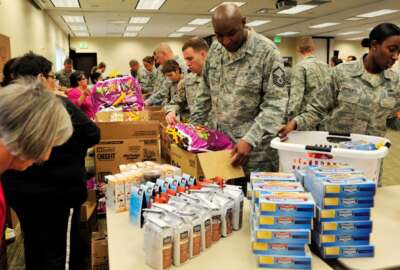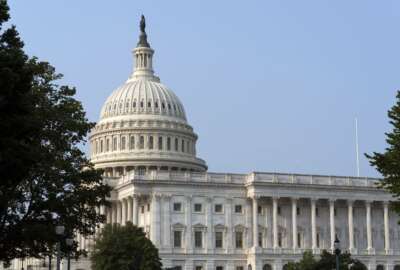
Military leaders seek measures to end food insecurity among service members
The Pentagon looks for new answers to ongoing questions about poverty levels for junior enlisted service members.
One in four active duty military members has some level of food insecurity according to numbers reported by a recent RAND Corporation study. While it may not be a new problem, senior enlisted military leaders who testified on Capitol Hill last week said economic challenges over the past year have added to food insecurity.
Secretary of Defense Lloyd Austin commissioned the RAND study after the fiscal 2020 National Defense Authorization Act directed the secretary to provide a report on food insecurity among members of the armed forces and their dependents.
After years of reports on hunger, including similar conclusions in a biennial report on service members put out by the Pentagon, the Defense Department has at least one new program to directly address the problem.
This year, the military began adding a new benefit for service members at greatest risk of food insecurity. The Basic Needs Allowance (BNA) provides a monthly stipend for service members whose gross household income falls below 130% of federal poverty guidelines. The allowance adjusts the member’s income to the 130% level. So if a military member has an adjusted monthly income that is $500 below that level, the BNA would provide $500.
Members of the House Armed Services Committee (HASC) military personnel subcommittee got an update last week on the problem from non-commissioned leaders in each of the military services. Sergeant Major of the Army Michael Grinston said the BNA offered some help towards making sure soldiers could pay for food.
“I want to say that no soldier should ever have to miss a meal. No soldier, no family should be food insecure in our military. And I do want to thank this committee and everyone for the Basic Needs Allowance, for allowing us to increase some of the pay for our service members,” Grinston said.
Service members qualify for the BNA after their military branch does an initial screening. If it looks like the member qualifies, they get notified that they can apply for the subsidy. A member can also apply without getting notice of a screening. If their application is accepted, they get the extra allowance on a monthly basis, and they have to apply to requalify for it each year.
But many service members show reluctance to ask for help. The RAND study reported that of those members classified as food insecure in 2018, only 14% reported using food assistance. When asked, many cited concerns about their security clearances as a reason not to seek food or financial assistance.
“The numbers are really hard to track. We’ve been trying to figure this out for the past several years,” said Chief Master Sergeant of the Air Force JoAnne Bass “Some of it is largely in part because you only understand the numbers of people who might self-identify, but there’s a lot of folks who won’t self-identify that they need assistance. We’ve really engaged our command teams, our first sergeants to help us ensure that we are getting a really good look at what’s going on at the grassroots level.”
The Pentagon’s proposed budget for fiscal 2024 targets some of the issues related to food insecurity. The budget has a 5.2% pay raise for both uniformed and civilian (DoD) employees. Additionally, the basic allowance for housing would increase by 4.2%, and basic allowance for subsistence, the money for food, would go up by 3.2%. The pay raise would be the highest in 20 years and the housing and subsistence increases the highest in 40 years.
The senior enlisted leaders testifying before HASC agreed that higher pay was the real solution, and anything else was more of a band-aid.
“We really need to take a holistic look at military pay and compensation, we need a holistic look at our health care for service members and their families to make sure that the decisions we make today are helpful to the future that we’ve got to have,” said Bass.
Copyright © 2025 Federal News Network. All rights reserved. This website is not intended for users located within the European Economic Area.
Alexandra Lohr, a former staff member, covered the Defense Department for Federal News Network until September 2023.






